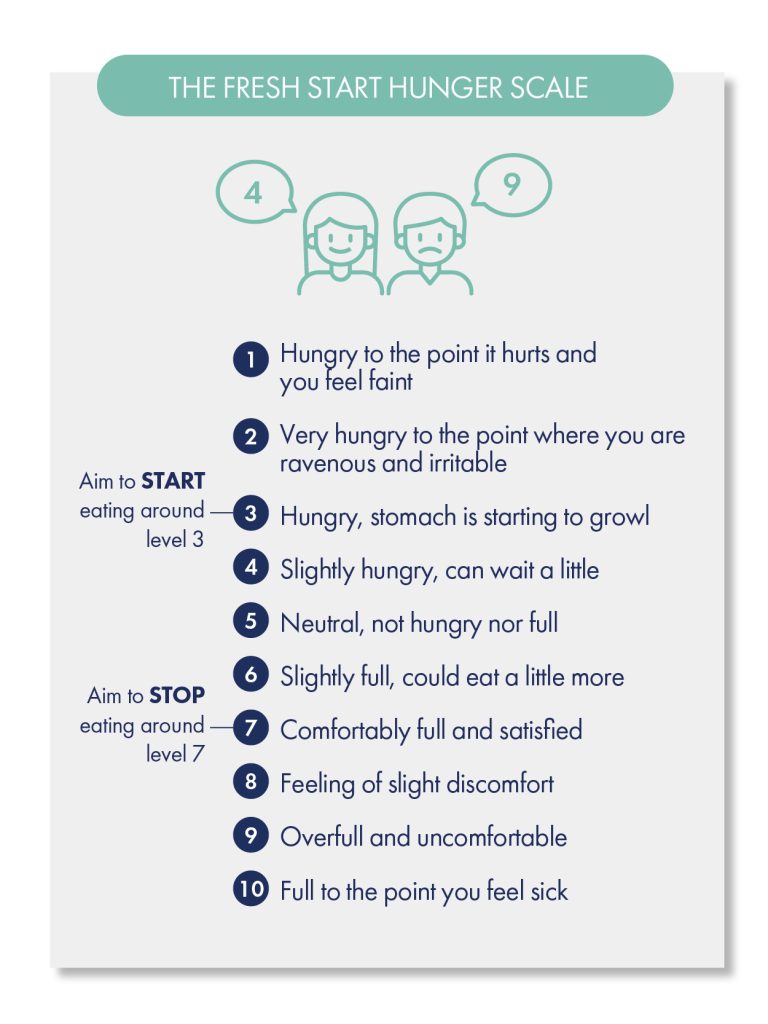
It’s Mindfulness Month from 1-31 July and the theme of week four is mindful eating. Registered Dietitian and Nutrition Manager at My Food Bag Lily Henderson dives into the art of mindful eating with tips to help you put it into practice during Mindfulness Month and beyond.
Most of us are not mindful eaters
Hands up if you often eat while driving, at your desk or while scrolling your phone? You’re not alone! In today’s fast-paced world it’s become socially acceptable to eat and multi-task. The downside? It means we eat quickly and don’t enjoy our meal as much as we could.
What is mindful eating?
An easy way to think about mindful eating is that it’s paying attention to ‘how’ we eat food (1).
It means that you’re:
- Listening your body, tuning into your appetite and taking a moment to decide whether you feel hungry before eating.
- Being fully present while eating. For many people this means slowing down and noticing the smell, texture, taste, flavours and temperature when taking each bite.
- Eating until you feel satisfied and realising when you’ve had enough.
- Eating nourishing and delicious food and giving yourself permission to enjoy it!
- Appreciating where your food has come from and the resource that have gone into growing and preparing it whether that was by you or someone else.
The good news? When we practice mindful eating, we can fully embrace the joy of eating. We may also become better at telling the difference between our physical hunger and emotional hunger which can improve our relationship with food (2).
Although there isn’t any good evidence to suggest that mindful eating improves diet quality or our food intakes, many people find they feel more satisfied when they eat in this way (3).
5 easy ways to be more mindful
1. Put down your phone
If you eat and scroll it makes it virtually impossible to eat mindfully and feel satisfied.
Tuck your phone away and out of sight when you eat a meal. This way you can fully tune in and experience the full enjoyment of your meal.
2. Use a plate and sit down
If you have a habit of standing at the cupboard and grazing, it’s time to create a new habit (and some dishes!)
Whether it’s a meal or snack, put it onto a plate and sit down at a table to enjoy it. It could be a coffee table and doesn’t matter as long as you’re comfortable!

3. Listen to your inner voice
How many times a day do you eat something without actually feeling hunger cues?
We’re used to automatically putting food in our mouths often without questioning it.
Take a moment to ask yourself a quick question before you start eating. Am I hungry? Or am I tired, bored, thirsty or stressed?
4. Rate your hunger
Try thinking about your hunger and fullness on a scale of 0-10.
During Mindful eating week using our hunger scale, to judge when and how much you need to eat. It is a great tool for encouraging intuitive eating and listening to your body.

Give yourself permission to leave food on your plate. You can always package it up for tomorrow’s lunch or have the rest at another meal.
5. Chew, chew, chew
If you usually wolf down your food, it’s time to practice slowing down!
Reducing the speed you eat benefits your digestion and helps you to feel more satisfied. Focus on the first couple of mouthfuls of each meal and chew it several times before swallowing.
This will allow the brain and stomach the time to communicate and send signals before you are stuffed and overfull.
Challenge yourself
Now it’s time to pick one area you could improve on and set a goal for the week. We’ve got some ideas below or you can create one for yourself.
Goal: have a meal around the table at least once a day with other people in your household
Goal: put your phone away for all mealtimes this week
Goal: eat your lunch away from your desk every day this week
Goal: rate your hunger before and after each meal for a few days or the whole week
Finally…
Remember like all new skills, it can time to develop a new behaviour and with enough repetition you can re-wire your brain to take a different approach to food. It’s unrealistic to mindfully eat every moment of each day, but small steps to become a more conscious eater will have a positive impact during the challenge and beyond.
References
(1) Nelson JB. Mindful Eating: The Art of Presence While You Eat. Diabetes Spectr. 2017 Aug;30(3):171-174.
(2) Morillo-Sarto Het al. ‘Mindful eating’ for reducing emotional eating in patients with overweight or obesity in primary care settings: A randomized controlled trial. Eur Eat Disord Rev. 2023 Mar;31(2):303-319. doi: 10.1002/erv.2958. Epub 2022 Nov 17.
(3) Ruffault Aet al. The effects of mindfulness training on weight-loss and health-related behaviours in adults with overweight and obesity: A systematic review and meta-analysis. Obes Res Clin Pract. 2017 Sep-Oct;11(5 Suppl 1):90-111. doi: 10.1016/j.orcp.2016.09.002. Epub 2016 Sep 19.


